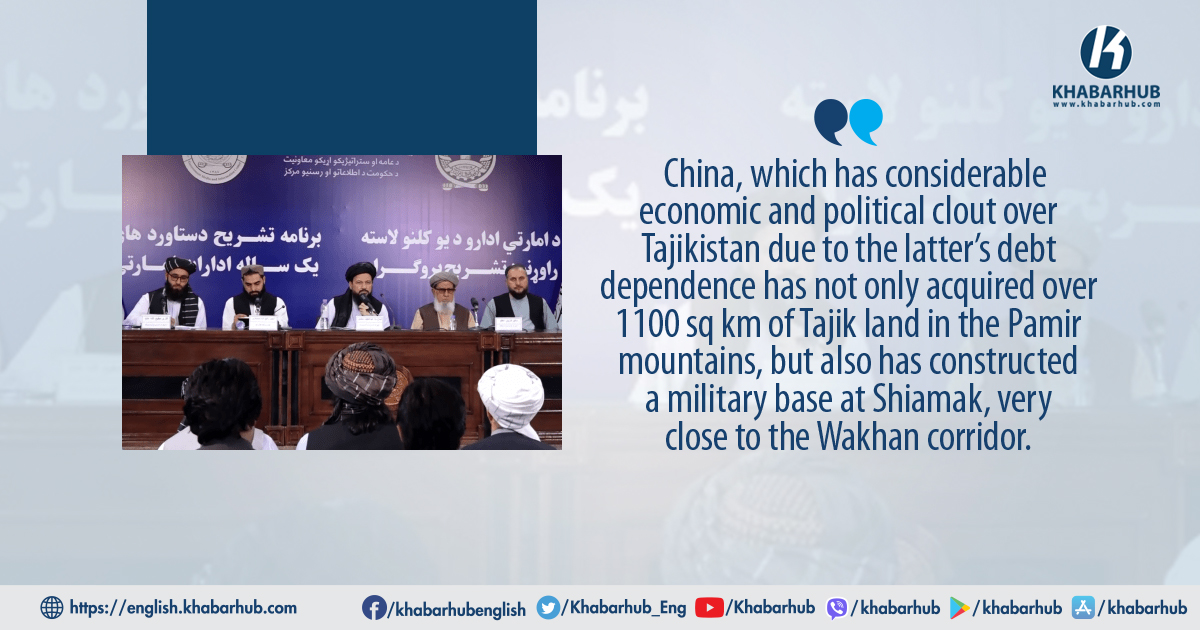The Afghan Taliban has reportedly refused to acknowledge Pakistan’s control and claims over Gilgit Baltistan.
Media reports suggest that while marking boundaries in the Wakhan, Zebak, Koran and Monjan districts of Badakhshan recently, including the line with Pakistan, and the official boundaries with Jammu and Kashmir (J&K) and Tajikistan, the Taliban refused to recognize Pakistan’s claim to Gilgit Baltistan.
Zee News reported on 22 July that the Taliban did not use the term “Pakistan-occupied territory,” indicating that Afghanistan has clearly ignored Pakistan’s claim.
The context for this statement comes amidst the Taliban announcing plans to revise its borders with all the Central Asian countries.
Acting Afghan Minister of Energy and Water Resources, Abdul Latif Mansour, stated (7 August, Tolo News) that Afghanistan’s borders with Central Asian countries had been eroded, and therefore needed to be revised.
“Due to floods, our borders with Tajikistan, Uzbekistan, and Turkmenistan were eroded. We are working to restore these borders and have already discussed this issue with our supreme leader,” Mansour said.
Apart from coveting that territory, China has also used terrorism emanating from Afghanistan and Xinjiang as an excuse to build a counter-terrorism centre in Tajikistan in the Gorno-Badakhshan Autonomous Oblast near the border with Afghanistan close to the Wakhan corridor as mentioned above.
Mansour said the plan to revise the borders was developed on the instructions of the supreme leader will be implemented jointly with the ministries of the Interior, Foreign Affairs, Defence, and the General Intelligence Directorate.
The Ministry spokesman assured those assembled that Afghanistan’s actions on water resources management will not harm neighbouring countries.
Currently, the borders of Tajikistan, Uzbekistan, and partially Turkmenistan with Afghanistan, run along the Amu Darya River.
The Taliban began construction of the Qosh Tepa irrigation canal, originating in the Amu Darya River in early 2022. On completion in 2028, the canal will supply water to the northern provinces of Faryab and Balkh in Afghanistan.
Land for three other irrigation projects is being allocated, including in the province of Jawzjan.
News of the construction of the canal has reportedly raised concerns in neighbouring Central Asia, especially in Uzbekistan and Turkmenistan, which depend on water from the Amu Darya.
However, Afghan authorities argue that they have a legal right to their share of the river’s flow, which they have not yet utilized.
The reported non-recognition of Pakistan’s claim is important and bolsters India’s claims that it shares a border with Afghanistan connecting India with the Wakhan Corridor in the Badakhshan province.
The other point of note is that Afghanistan has never accepted the Durand Line as the boundary between Pakistan and Afghanistan.
In February 2024, Deputy FM Sher Mohammad Abbas Stanikzai said Afghanistan would never recognize the Durand Line as its official border with Pakistan, Khaama Press reported. Stanikzai made these remarks while commemorating the 35th anniversary of the USSR’s withdrawal from Afghanistan.
Bilateral relations with Pakistan have deteriorated since the Taliban takeover of Afghanistan.
There has been a surge in militant attacks, including suicide bombings, in Pakistan’s northwestern and southwestern parts bordering Afghanistan.
Alleging that the Taliban was providing shelter to the militants of the Tehreek-e-Taliban Pakistan, Islamabad ordered all illegal immigrants, mostly Afghans, to leave Pakistan last year.
More than half a million Afghans have since gone back or been expelled to Afghanistan.
Currently, the Wakhan Corridor shares a border with Khyber Pakhtunkhwa in Pakistan, China, Tajikistan and is thus of immense strategic value.
China, which has considerable economic and political clout over Tajikistan due to the latter’s debt dependence has not only acquired over 1100 sq km of Tajik land in the Pamir mountains, but also has constructed a military base at Shiamak, very close to the Wakhan corridor.
China has a very high stake in Afghanistan and has eyed the Wakhan corridor as a suitable entry point for its Belt and Road Initiative.
If recent reports of the Afghan Taliban having repudiated Pakistan’s claims to Gilgit Baltistan are accurate, the Taliban administration must have taken into account the 1963 agreement.
Apart from coveting that territory, China has also used terrorism emanating from Afghanistan and Xinjiang as an excuse to build a counter-terrorism centre in Tajikistan in the Gorno-Badakhshan Autonomous Oblast near the border with Afghanistan close to the Wakhan corridor as mentioned above.
Pertinently, the China-Afghanistan border was delimited by an agreement signed on 22 November 1963 in Beijing.
The CIA declassified archives cite a message from the US Embassy in New Delhi (14 December 1963) to the State Department which states that “The treaty denotes the southern extremity of the border by coordinates, and does not refer by name to contiguous territories, thus avoiding direct reference to the Pakistan-India dispute over Kashmir.
The treaty was effective on the date it was signed, and the boundary on the ground will be marked next summer.”
Commenting on the implications of the treaty, the State Department notes that “Indian Embassy officials have expressed relief that the Afghans refused the Chinese request that the treaty refer to this point (southern extremity) as being contiguous to Pakistan, which would have given support to the latter in the Kashmir dispute.”
If recent reports of the Afghan Taliban having repudiated Pakistan’s claims to Gilgit Baltistan are accurate, the Taliban administration must have taken into account the 1963 agreement.
This is a fair surmise, as they are now proposing to revise their boundary with all Central Asian countries, without mentioning Pakistan!
Thus, the strategic significance of the Wakhan corridor cannot be denied in the present context.
Hence, India needs to reshape and strengthen its policy towards its legitimate claim including its border with China, which often gets left out in any discourse on the matter.
There is need to create awareness regarding India’s claim, not only internationally, but also domestically.
That the option of resorting to the use of force to reclaim the region always exists for India is a given, but this will require a careful reading of the tea leaves in the Chinese garden.









Comment